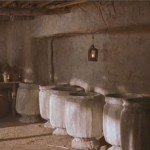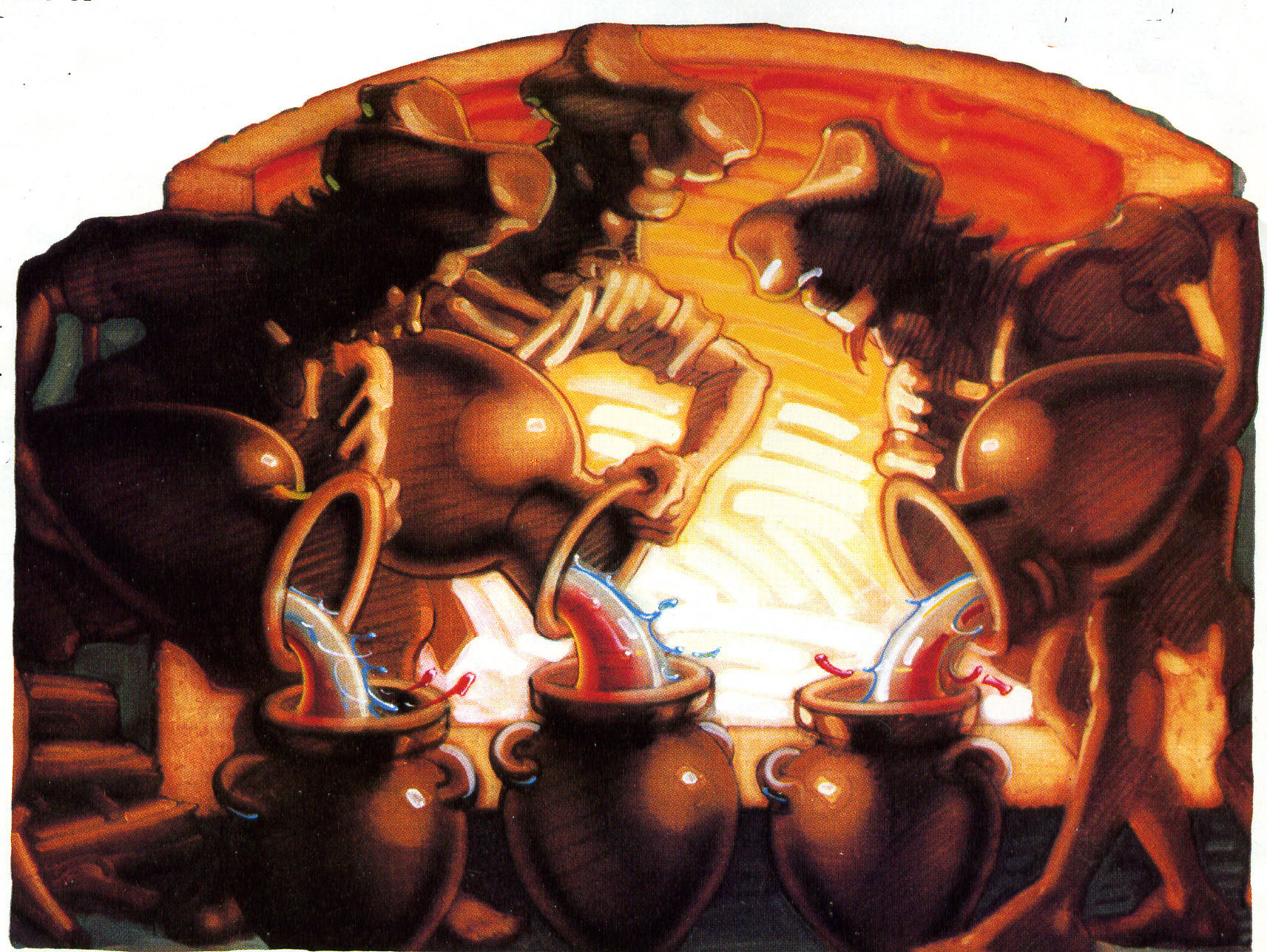This story, as many others, is just bubbling over with symbolism. It’s not just about helping out the bride and groom, but it’s about how pathetic religion is compared to a relationship with Jesus because he died for you. I know, you already think I’m stretching it. Give me a chance.
The first word is “and,” indicating a connection with chapter 1. At least one prominent theme in chapter 1 is the failure of Judaism (religion), and how Jesus is the real truth of the matter. There’s already a hint of something more.
 Jesus and his disciples are at a wedding. First, picture that they’ve rented this long, long donkey… : ) Weddings in Galilee were huge occasions, lasting about 7 days, with invitations issued to as many people as possible. They included a series of entertainments and food, food, food. So keep the idea of lots of pomp and circumstance in the back of your head.
Jesus and his disciples are at a wedding. First, picture that they’ve rented this long, long donkey… : ) Weddings in Galilee were huge occasions, lasting about 7 days, with invitations issued to as many people as possible. They included a series of entertainments and food, food, food. So keep the idea of lots of pomp and circumstance in the back of your head.
They’re in Cana, Nathanael’s home town—another connection with chapter 1. It was a village of 400 people, mostly Jewish folks, though some Gentiles probably lived there as well.
Verse 3 shocks us with a sudden and unexpected plot line: the wine runs out. Culturally, this is an embarrassing social faux pas that could be the source of put-down jokes for years to come. What you also need to know, though, is that in ancient Israel, wine was a symbol of their country (Isa. 5.7), and so also their religion and their covenant with God. Remember all the pomp and circumstance? Think of organized religion. The plot line of the story is instantly The wine is gone. Hmm. You see what I mean? Tasker comments that in making her request Mary may be expressing her concern for the wedding party, but it suggested to Jesus, as was his style to interpret things, the much deeper need of humanity that was his mission to satisfy. People had no means to deal with lack of “wine” on their own, and Jesus was destined to tread the winepress alone (Isa. 63.3), pouring out the wine of his own blood (1 Cor. 11.25). This isn’t just far-fetched interpretation, because notice how Jesus replies to his mother. Without scolding her he lets her know that his concern is different from hers. Mary catches on at least enough to tell the servants, “Do whatever he tells you.” Now the symbolism ramps up.
 “Nearby stood six stone water jars, the kind used by the Jews for ceremonial washing…” Oh, these pots are part of the Jewish ceremonial system. Why does the storyteller bother with that detail if the story is just about Jesus’ power to do a miracle? It’s more likely that these pots may symbolize Judaism, religion, ceremonialism. And they’re empty. OK, so the wine is gone, and the pots are empty. The symbolism is striking and building.
“Nearby stood six stone water jars, the kind used by the Jews for ceremonial washing…” Oh, these pots are part of the Jewish ceremonial system. Why does the storyteller bother with that detail if the story is just about Jesus’ power to do a miracle? It’s more likely that these pots may symbolize Judaism, religion, ceremonialism. And they’re empty. OK, so the wine is gone, and the pots are empty. The symbolism is striking and building.
The servants fill the pots with water. “Now draw some out and take it to the master of the banquet.” Apparently the water was still water when it came out of the jars, but changed to wine before reaching the guests. What seems like something plain—something like everything else—is going to be shown to be spectacularly different, and superior.
By turning this water to wine, Jesus is announcing, through a symbolic act, that he is the new wine—the new way of relating to God. He has come to fulfill and supersede the ceremonial laws. The former wine has run out; the pots are empty. New wine is needed, and Jesus is it. His wine fills in where the other can’t go. “You have saved the best wine until now!” This wine is the good wine. Wine is a symbol of joy (Ps. 104.15; Judges 9.13). This wine is a symbol of His blood, the new spiritual power for humankind. It is provided freely and in abundance. It’s a great symbol of salvation through the One who provided it for them. Jesus was the source and Jesus was the means. And it turns out that Jesus is the point of it all. He was inaugurating the New Covenant with the new wine of Himself. He stands as the last and greatest One who brings joy and salvation to the earth.
The disciples considered it not just a miracle, but a sign. “He thus revealed his glory, and they put their faith in him.” Now who’s on the “witness stand” telling us who Jesus is? His followers who have seen his power and have had another hint of his mission.

Good job! Thank You!
Terima Kasih bro!
I love the illustration of how the new wine tastes better than the first batch of wine. Jesus is the new wine who exceeds far beyond measure anything that the law could provide for salvation, which is nothing. For by grace are we saved through faith and that not of ourselves (no one on he groom’s side could get more wine for a 7 day celebration after the wine ran out on the 1st day); it is the gift of God! Jesus, Jesus is the GIFT!
Excellent comment. Thanks for taking the time to write it. 🙂